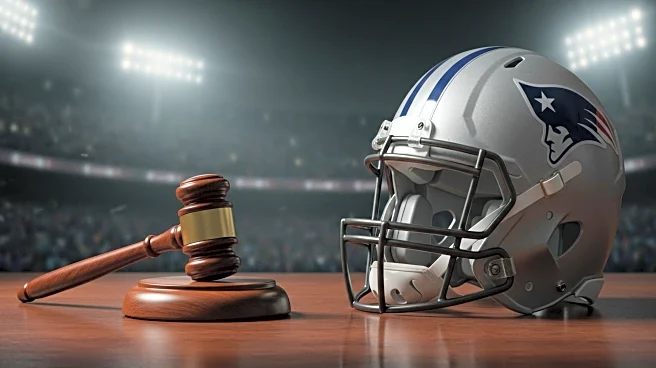What's Happening?
The NCAA has announced significant penalties against the University of Michigan's football program following a sign-stealing investigation. Former head coach Jim Harbaugh, current head coach Sherrone Moore, former analyst Connor Stalions, and former director of player personnel Denard Robinson have been disciplined. Harbaugh received a 10-year show-cause order, prohibiting him from any athletically related activities starting August 7, 2028. Moore faces a two-year show-cause order and a one-game suspension for the 2026 season. Stalions and Robinson received eight-year and three-year show-cause orders, respectively. The investigation revealed that Michigan gained impermissible access to opposing teams' signals during the 2022 season, leading to these sanctions. The program also faces four years of probation, a $50,000 fine, and restrictions on recruiting activities.
Why It's Important?
The penalties imposed on Michigan's football program highlight the NCAA's commitment to maintaining fair play and integrity in college sports. These sanctions could impact Michigan's recruiting capabilities and overall competitiveness in the coming years. The financial penalties and restrictions on official visits and recruiting communications may hinder the program's ability to attract top talent. Additionally, the reputational damage from the scandal could affect the university's standing in collegiate athletics. The severe penalties serve as a warning to other programs about the consequences of violating NCAA rules.
What's Next?
Michigan will need to navigate the probation period while adhering to the imposed restrictions. The program must focus on rebuilding its reputation and ensuring compliance with NCAA regulations. The departure of Jim Harbaugh to the Los Angeles Chargers marks a significant change in leadership, with Sherrone Moore taking over as head coach. The university will likely implement measures to prevent future violations and restore trust within the collegiate sports community. Stakeholders, including fans and alumni, will be watching closely to see how the program responds to these challenges.
Beyond the Headlines
The scandal raises ethical questions about the lengths to which collegiate programs might go to gain competitive advantages. It underscores the importance of transparency and accountability in sports management. The incident may prompt broader discussions about the culture of competitiveness in college athletics and the pressures faced by coaches and staff. Long-term, this could lead to increased scrutiny and regulatory measures to prevent similar incidents across other programs.









